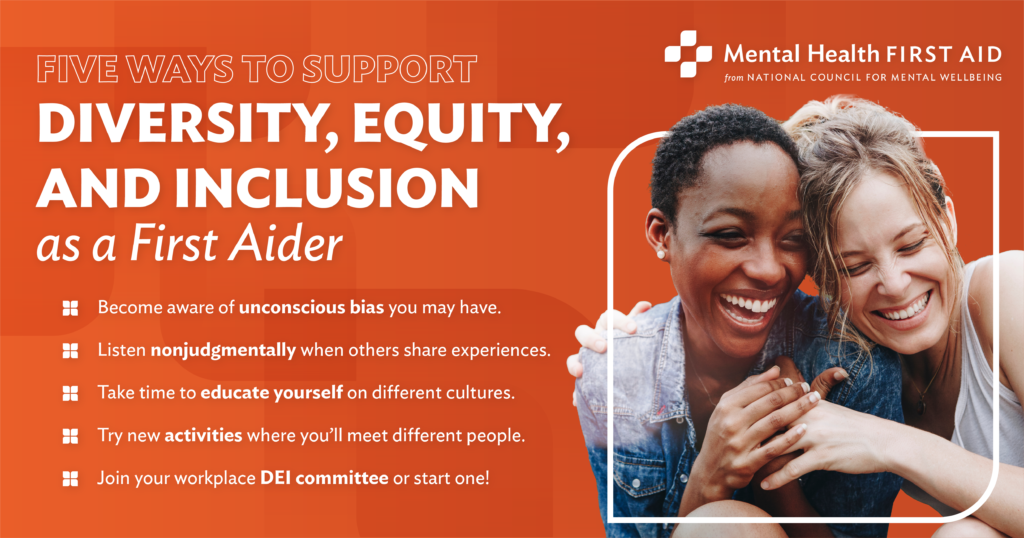By Mental Health First Aid USA on July 13, 2021
Interacting and working with people of diverse cultures and backgrounds is commonplace today, and we are presented with new experiences and opportunities to learn from each other often. In fact, many companies and businesses now have established diversity, equity and inclusion (DEI) committees to ensure that employees of color are a part of the conversation, treated equally and have opportunities to share experiences with their colleagues. These groups can play a large part in business strategy and workplace culture.
DEI doesn’t have to — and shouldn’t — stop in the workplace. More people are becoming part of the conversation both in and out of the workplace, so we’ve gathered some tips from the Mental Health First Aid curriculum and other resources to help support DEI in your daily life:
- Become aware of unconscious bias you may have. The Perception Institute defines unconscious or implicit bias as attitudes or stereotypes we may hold – but don’t realize we have — toward people. Implicit bias happens without your knowledge, and it happens to everyone! You can take steps to “de-bias” your thoughts so you can treat everyone with equal respect. If you’re curious about your own levels of implicit bias, you can take a quiz online.
- Listen nonjudgmentally. When discussing sensitive topics like race or cultural differences, it’s important to listen nonjudgmentally. Try not to interrupt the person as they are speaking and be open to learning. Actively listen to show you are affirming someone’s experiences and try not to delegitimize them – being respectful of another person’s story will go a long way. Remember that just because you may not have had the same experience, it doesn’t make theirs any less genuine.
- Take time to educate yourself. If you’re not sure where to start, Google is your best friend. All it takes are a couple of quick searches and you’ll be well on the way to having a better understanding of those around you. Try to find unbiased resources to make sure you’re getting the most accurate information possible – we’ve also listed some below.
- Discover new activities where you’ll meet new people. As states begin to open back up, there will be more opportunities to attend culture fairs and events that are new to you. If you’re not able to attend a fair or event in person, there are plenty of online events (cooking classes, music performances and more) celebrating different cultures and holidays. We learn through novel experiences, so don’t shy away from attending an event or celebration that is outside of what you’re used to – and it’s a perfect opportunity to take a friend along with you.
- Join your workplace DEI committee. If your workplace doesn’t have one, suggest it to your HR department! There is always room to learn, and opening the space for conversations at work may inspire you (and your colleagues) to think more critically about the issues people of color face in and out of the workplace. Everyone deserves to feel supported at work, and we can always do more to support one another.
Talking about diversity, equity and inclusion isn’t just about making sure everyone is equal at work. It’s important to learn about people’s cultures and backgrounds so you can offer the best support possible – taking the time to learn about someone else also shows that you care about and respect them. Take advantage of new experiences and have those open conversations, even if they’re uncomfortable. We can #BeTheDifference for our colleagues, friends, neighbors and ourselves when we make diversity, equity and inclusion part of the conversation.
We encourage you to explore more resources and ways you can support diversity, equity and inclusion below:
The Perception Institute
Five Ways to be More Culturally Aware
Supporting the Black Community as a Mental Health First Aider
Learning for Justice

References:
Mental Health First Aid USA. (2020). Mental Health First Aid. Washington, DC: National Council for Mental Wellbeing.
Perception Institute. (2021). Implicit Bias. https://perception.org/research/implicit-bias/
Harvard University. (2011). Project Implicit. https://implicit.harvard.edu/implicit/
